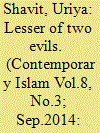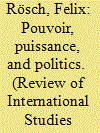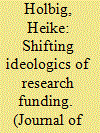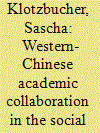| Srl | Item |
| 1 |
ID:
134221


|
|
|
|
|
| Publication |
2014.
|
| Summary/Abstract |
Through an analysis that focuses on wasati and salafi fatwas, but searches also beyond them, this article demonstrates the emergence of a broad agreement (albeit not a consensus) in Islamic jurisprudence on the permissibility of political participation in the West. This broad agreement is based primarily on jurists' evaluation, drawing on 'fiqh al-muwazanat' (the jurisprudence of balances) that, in some cases, participation brings more benefit (maslaha) than harm (mafsada). The article comparatively examines wasati and salafi approaches to politics and to Muslim minorities to explain why jurists who disagreed on other fundamental issues in the field of fiqh al-aqalliyyat al-Muslima (the religious law of Muslim minorities) reached similar (but not identical) conclusions on political participation. Based on this analysis, a revision of some prevailing categorizations of salafiyya is suggested. Deliberations by some salafis, jihadi-salafis and members of Hizb al-Tahrir who oppose political participation and their refutations of the justifications invoked by jurists who legitimized it are also examined.
|
|
|
|
|
|
|
|
|
|
|
|
|
|
|
|
| 2 |
ID:
131710


|
|
|
|
|
| Publication |
2014.
|
| Summary/Abstract |
Hans Morgenthau's concept of power is widely debated among scholars of International Relations. Superficial accounts present Morgenthau's concept of power in the Hobbesian tradition as a means of self-preservation; however, more thorough investigations demonstrate Morgenthau's psychogenic and praxeological understanding. By referring to Sigmund Freud and Max Weber, such accounts identify Morgenthauian power as the ability to dominate others. This article contributes to this discourse by demonstrating that Morgenthau separated power into two dualistic conceptualisations. Although analytically Morgenthau worked with a concept of power understood as domination, normatively - in reference to Friedrich Nietzsche and Hannah Arendt - he promoted a concept of power that focused on the will and ability to act together. Elaborating this dualistic concept has wider implications for current International Relations because it reminds scholars to be self-reflexive. In addition, it is argued that a Morgenthauian scholarship helps scholars to gain a more profound understanding of depoliticising tendencies in Western democracies.
|
|
|
|
|
|
|
|
|
|
|
|
|
|
|
|
| 3 |
ID:
132728


|
|
|
|
|
| Publication |
2014.
|
| Summary/Abstract |
For more than two decades, the National Planning Office for Philosophy and Social Sciences (NPOPSS) has been managing official funding of social science research in China under the orbit of the Communist Party of China's (CPC) propaganda system. By focusing on "Major Projects", the most prestigious and well-funded program initiated by the NPOPSS in 2004, this contribution outlines the political and institutional ramifications of this line of official funding and attempts to identify larger shifts during the past decade in the "ideologics" of official social science research funding - the changing ideological circumscriptions of research agendas in the more narrow sense of echoing party theory and rhetoric and - in the broader sense - of adapting to an increasingly dominant official discourse of cultural and national self-assertion. To conclude, this article offers reflections on the potential repercussions of these shifts for international academic collaboration
|
|
|
|
|
|
|
|
|
|
|
|
|
|
|
|
| 4 |
ID:
129467


|
|
|
|
|
| Publication |
2013.
|
| Summary/Abstract |
THE ANALYTICAL LEVADA CENTRE HAS RIGHTLY RECEIVED the reputation as a very reliable source of information on Russia's public opinion. References to the data of surveys conducted by the Centre are common in publications by Western scholars discussing contemporary Russian politics and social life. However, the Western audience is not well acquainted with the works of the Centre's leading researchers. Today Lev Gudkov and Boris Dubin, who collaborated for many years with the late Yurii Levada, are the key figures in the Centre's research activities. Both worked in the VTsIOM (All-Russia Centre for the Study of Public Opinion) from the end of the 1980s until its transformation into a state-controlled organisation in 2003, when they left it for the newly established Levada Centre. They have both contributed to the research project 'The Soviet ordinary person' (sovetskii prostoi chelovek) which became the basis of many of the Centre's studies.
|
|
|
|
|
|
|
|
|
|
|
|
|
|
|
|
| 5 |
ID:
132727


|
|
|
|
|
| Publication |
2014.
|
| Summary/Abstract |
It would be naïve to pretend that politics and the actual needs of governance do not play a role in social sciences in any part of the world. However, the political dismissal of faculty members in Chinese universities, along with other political interventions reported in recent Western media, reveals the outspoken trend toward scientific professionalization and scientific autonomy in a different light. The professionalisation, internationalisation, indigenisation and marketisation of social science does not necessarily diminish the role of politics and ideology or even
|
|
|
|
|
|
|
|
|
|
|
|
|
|
|
|